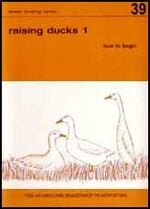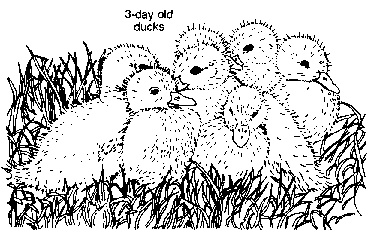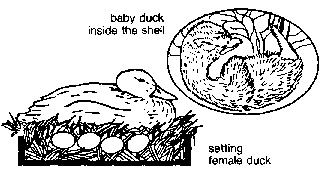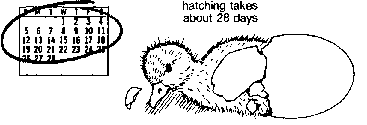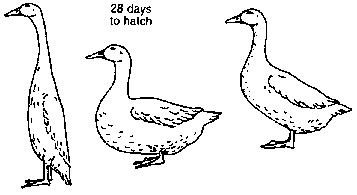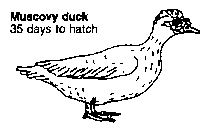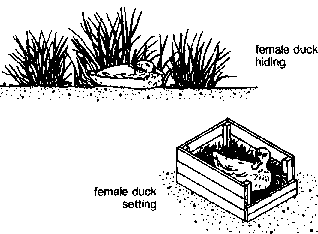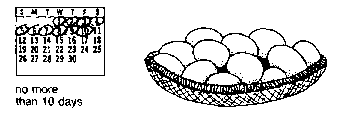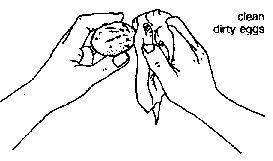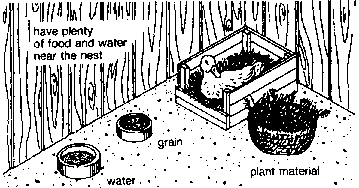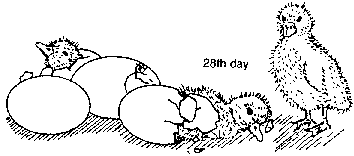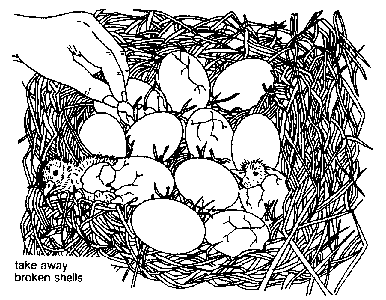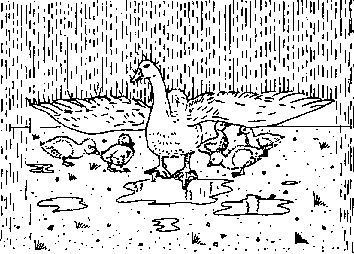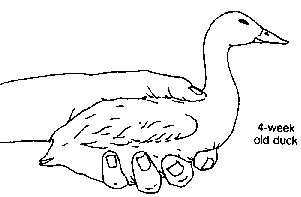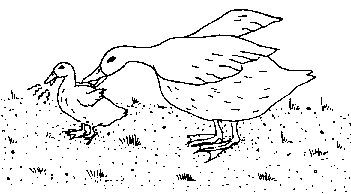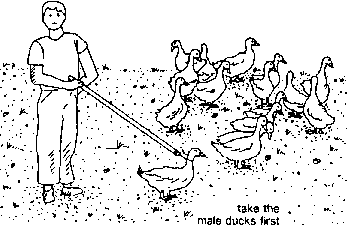133. Earlier in this booklet, you were told that you can raise as many as 24 ducks that live by themselves and find their own food, with very little help from you.
139. So, if you would like to have more ducks, the easiest way to get them is to raise your own baby ducks.
3- day old ducks
140. By raising your own baby ducks, you can add to your small flock little by little until it is the size you want.
141. However, you must have fertile eggs. If your small flock has a male duck, the eggs you get will be fertile and you can begin to raise baby ducks.
Hatching your own eggs[edit | edit source]
142. A baby duck grows inside the shell of a fertile egg when it is kept warm. Eggs are kept warm when a female duck sits on them. This is called setting.
Setting female duck, baby duck inside the shell
143. After 28 days the baby duck is ready to come out of its shell. This is called hatching.
Hatching takes about 28 days
Note:
The eggs of most kinds of ducks that you are likely to find where you live take 28 days to hatch.
28 days to hatch
However, there is one exception. The eggs of a Muscovy duck take 35 days to hatch. You will learn more about the Muscovy in the next booklet in this series.
Muscovy duck 35 days to hatch
Muscovy duck - 35 days to hatch
Setting the female duck[edit | edit source]
144. When a female duck tries to hide or sits on a nest more and more, she is probably ready to set.
Female duck hiding; female duck sitting
145. Make her a setting nest in a quiet dark place well sheltered from rain, sun and wind.
146. You have already been told, that the nest can be a simple hole in the ground or a box lined with clean, dry grass or straw.
Hole in the ground; box
147. A female duck can cover 10 to 12 eggs. So, try to collect this many eggs from your flock.
10 to 12 eggs
148. However when you collect the eggs handle them very carefully. If you shake eggs too much they may not hatch.
149. Eggs which are very small or very large may not hatch. So, choose medium sized eggs.
Choose medium- sized eggs
150. Eggs to be used for setting should be no more than 10 days old. Eggs which are older may not hatch.
No more than 10 days
151. The eggs should be clean. If they are dirty, clean them with a soft, damp cloth.
Clean dirty eggs
152. When you have the right number of eggs, put them in a nest in a quiet place and the female will begin to set.
153. When one of your female ducks is setting on a nest, make sure that she has enough food and water nearby.
154. If she has to go too far to find food and water the eggs may get cold and not hatch.
Have plenty of food and water near the nest
155. On or a little before the 28th day your baby ducks will begin to hatch.
28th day
156. They will begin breaking out of their shells little by little. It may take as long as 2 days until all the baby ducks are hatched.
157. As the baby ducks hatch, take away the pieces of broken shell from the nest.
Take away broken shells
The baby ducks[edit | edit source]
158. After all the baby ducks have hatched, a good rule to follow is... bother them as little as possible. The female duck will take good care of her babies.
The female ducks taking care of their babies
159. However, your baby ducks will need some special care for the first 4 weeks. You should be sure to
· see that they are warm
· give them shelter in bad weather
· keep them apart from the rest of the flock
· feed them well
160. For the first 4 weeks give the baby ducks all of the left- over food that you usually give to the rest of the flock.
Putting your new baby ducks with the flock[edit | edit source]
161. When your baby ducks are 4 weeks old they can begin to live with the rest of the flock and eat the same food.
3- week old duck
162. If you see that the baby ducks are bitten by the older ducks and that they are not able to get enough food to eat, give them their food away from the rest of the flock.
An older duck may bite a baby duck
163. At first you can leave all of your younger male ducks with the flock.
164. As the young males grow older, it is best to eat or to sell them. This is because the young male ducks may be from the same family as your female ducks.
165. However, as your flock grows larger you will need more male ducks. So, try to buy them at the market or from another duck farmer. You may even be able to trade one or two of your young males for new ones.
Buy ducks
166. Remember, with a larger flock you must be sure to have the right number of male ducks.
|
FEMALES |
MALES | |
|
6 |
5 |
1 |
|
8 to 12 |
6 to 10 |
2 |
|
14 to 18 |
11 to 15 |
3 |
|
20 to 24 |
16 to 20 |
4 |
When to use or sell the meat[edit | edit source]
167. As your ducks grow older you can take them to eat or to sell as soon as you have enough young ducks to keep your flock the size you want. However, take the male ducks first.
Take the male ducks first
168. Ducks are old enough to eat or to sell at 10 weeks. When your ducks reach 2 years of age, replace them with young ducks.
